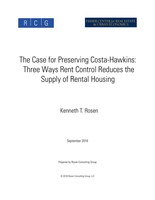BERKELEY, Calif., Sept. 4, 2018 /PRNewswire/ -- California already faces a housing supply crisis and is on the precipice of dramatically exacerbating the problem. "California cities need more rental housing at every price level, but rent control is a major road block to solving the statewide housing shortage," said Kenneth T. Rosen, Chairman UC Berkeley's Fisher Center for Real Estate & Urban Economics and Chairman and Founder of Rosen Consulting Group.
The Costa-Hawkins Rental Housing Act, enacted in 1995, was a compromise between local and statewide interests that allowed for rent control to continue, but placed pragmatic limits on rent control regulations in local jurisdictions. These limitations eased some of the most restrictive rules that existed in several California cities, which previously made it extremely difficult for property owners to maintain existing properties and for developers to justify the costs of new construction. As a result, construction activity increased in many markets in the years following the Costa-Hawkins legislation. While still insufficient to solve the statewide housing shortage, Costa-Hawkins represented an important step toward maintaining the existing supply of rental units and making the development of new housing supply viable in communities with rent control.
Today, this compromise is in jeopardy. Proposition 10, a statewide ballot initiative in the upcoming November 2018 election aims to repeal the 1995 law. On the surface, the measure looks to address statewide housing affordability concerns. However, a repeal of Costa-Hawkins is the antithesis of what California renters need and will further exacerbate supply constraints and the statewide housing crisis.
The Case for Preserving Costa-Hawkins: Three Ways Rent Control Reduces the Supply of Rental Housing, is the first in a series of reports examining the economic and housing market impact of rent control. The paper highlights the three primary ways that rent control hurts California renters by decreasing the overall supply of apartments: 1) Rent control incentivizes property owners to convert rental units to other uses, such as for-sale housing units or non-residential buildings; 2) Rent control reduces the effective supply of available rental units through an inefficient allocation of housing; and 3) Rent control limits the creation of new rental supply by discouraging development activity. All of these factors combine to decrease the supply of rental housing in markets with rent control, which ultimately lowers apartment availability and raises rents.
The limited supply of housing represents a major threat to the California economy. "The last thing California needs is another barrier to building new rental housing," said Rosen. Instead, the best model for the California housing market would be to reduce barriers to construction in order to incentivize new supply and alleviate the perpetual cycle of housing scarcity. Preserving Costa-Hawkins is a critical first step to achieving this goal.
About the Study
The Case for Preserving Costa-Hawkins: Three Ways Rent Control Reduces the Supply of Rental Housing was prepared by Rosen Consulting Group and jointly released by Rosen Consulting Group and the Fisher Center for Real Estate and Urban Economics at the University of California, Berkeley Haas School of Business. This report is the first in a series of papers examining the economic and housing market impact of rent control and the importance of preserving the Costa-Hawkins Rental Housing Act.
About Rosen Consulting Group
Rosen Consulting Group (RCG) is a leading independent real estate economics consulting firm. Founded in 1990 and with offices in Berkeley and New York, RCG provides strategic consulting and unbiased investment guidance through all market cycles. RCG is a trusted advisor to leading banks, insurance companies, institutional investors, and public and private real estate operators. For more information, go to www.rosenconsulting.com.
About the Fisher Center for Real Estate & Urban Economics
The Fisher Center for Real Estate & Urban Economics (FCREUE) mission is to educate students and real estate professionals, and to support and conduct research on real estate, urban economics, and the California State economy. FCREUE strives to be the leading center for research on the California economy and excels nationally as a center for urban economic and public policy research. It also regularly provides a practical forum for academics, government officials, and business leaders. For more information, go to http://groups.haas.berkeley.edu/realestate/.
SOURCE Rosen Consulting Group
Related Links
WANT YOUR COMPANY'S NEWS FEATURED ON PRNEWSWIRE.COM?
Newsrooms &
Influencers
Digital Media
Outlets
Journalists
Opted In

Share this article